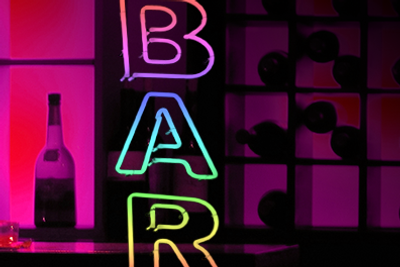By Danae Barnes, January 2016 Issue.
In the past year (or so), Phoenix has seen far more than it’s fair share of gay bars close their doors. From Zorf’s (formerly Friends and Cherry Bar) and Apollo’s Lounge to The Bar On Central (formerly Amsterdam) and Club 24 (formerly Incognito), it’s easy to see that times are changing.
Contrary to national trends, however, the Valley of the Sun is still home to not one, but two lesbian bars. (Read more on the national trend in "The Last Lesbian Bars.")
Echo Magazine spoke with Mel Odell, owner of the Valley’s newest lesbian bar, and Lisa Augustyn, who’s been at the helm of Cash Inn Country for the past decade, to get a better sense of the challenges facing the Phoenix gay and lesbian bar scene.
Earlier this year, Odell opened R Lounge on Seventh Avenue in the heart of the Melrose District – in the building that previously housed Desert Rose, then Misty’s, then Z Girl and, most recently, Zoan.
Echo: Why the name, and the location?
Odell: We named it R Lounge, because most people just say let’s go to “our bar.” So we opened it up as the R Lounge. This space has a history of being a women’s bar … Back when we bought and reopened the bar, most folks didn’t know the place had new owners. From our community, we get gay people, straight people, drag queens. We want it to be known that even though it’s a lesbian bar, we still want everyone to come, for everyone to feel comfortable here. We’ve got a young, fresh new energy – it’s our lounge, it’s our space.
When asked about the clientele at Cash Inn Country, Augustyn spoke to the historical need for a safe space.
Echo: As a country western bar, can you tell us why you’ve billed Cash Inn Country as a women’s bar?
Augustyn: It’s been strong priority of mine to keep women safe. In my own life, I was more of a black sheep, so I wanted to make Cash Inn Country safe for women when I took over 10 years ago. We’re predominantly a women’s bar, but of course have queers of all stripes. It’s a playground for everyone, but we want it to be a women-centered bar.
When asked why women are statistically less likely than their male counterparts to head to the bar, both bar owners offered valuable insight.
Echo: Can you talk about gay bars versus lesbian bars? Why does it seem the boy bars are doing better?
Odell: I think there are lots of reasons. One, women become a couple and they choose not to go out anymore. Two, they have children or they got involved with someone who has children. Three, women are more accepted anywhere, so sometimes having a lesbian bar is almost irrelevant. Woman can pretty much go anywhere and it’s accepted, which is why gay men [still] tend to need to have bars [specifically] for them.
Augustyn: Because gay is going mainstream, you can be welcomed everywhere else and have your own private party. In the past, we wouldn’t even think about going to a straight bar, but kids today will go around the corner and not even think about it.
Another shift affecting local gay and lesbian bars is the recent increase in access to, and convenience of, online dating services. With a click or a swipe, anyone can connect with other queers anywhere, anytime.
Echo: What effect do you think the dating apps and social media have had on gay and lesbian bars?
Augustyn: Since everyone is talking to everyone online, it feels like you are already talking to them. You just don’t have the same need to connect as you did. There’s no missing anyone anymore. We already know ‘how was your week?” before we ever see people. Everyone knows what you’re doing because of online media, and we see a real [challenge in] getting people to get together outside of the computer.
Both Odell and Augustyn acknowledge a decrease in patrons overall, whether they self-identify as lesbian or not. Regardless, both owners are cautiously optimistic about what’s next.
Echo: What are your thoughts on the future of the lesbian/gay bar?
Augustyn: Well, I took [Cash Inn Country] over a while back and have had a good run. We're in our 10th year and paying our bills.
Odell: When I opened up, I thought it was very important to have a women's bar. It’s more of a deal to the men, which makes it difficult for us. Older lesbian don't go out, and younger generation can go anywhere – and they do. Women go around to many different places, and they don't feel the need to have a specific place. But in 10 years, where will they go?
